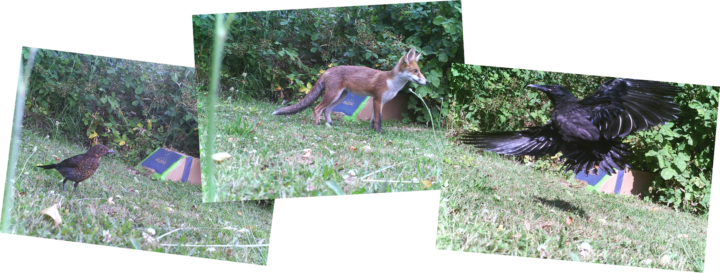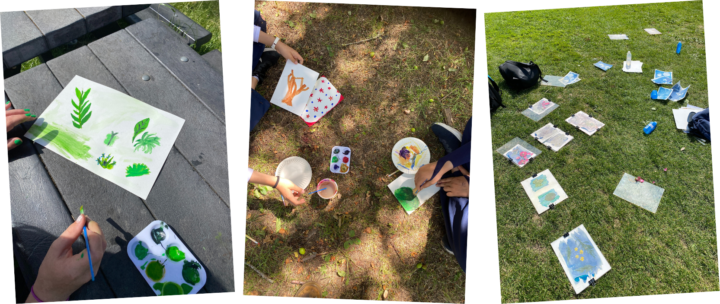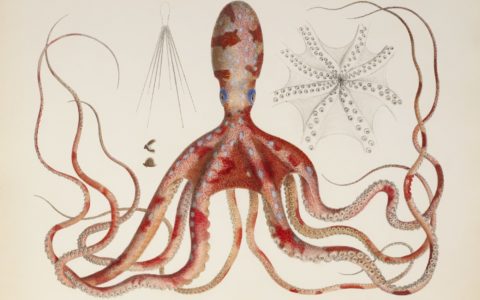Nature Network - first term in review
With the first term of out new funded nature project complete, see what we've been up too and how to join in!
Published on 7th August 2025
Now that the first term of delivery is complete, we'd love to hear from more secondary schools interested in taking part in our funded nature engagement project. If you have key stage 3 students and are based in North or West London, please get in touch.
Read on to learn more about what we've been up too and why it's so important!
The end of the summer term sees the end of the first run of Nature Network sessions wrapping up for summer. Following the success of the first term running we’re keen to work with more schools going forward! Over the last two months, we’ve been working with approximately 50 students across three schools, who’ve taking part in the inaugural term of our nature engagement project.
We’ve been making the most of the sun and spending time outside investigating and enjoying the green space on offer around our respective school sites. At a glance, a school site might seem a bit barren when it comes to wildlife, but you’d be surprised at what we have on our doorstep, here’s just some of the activities we’ve been getting up to this term;
- Across all our schools we made our own mammal footprint tunnels and found first hand evidence of foxes and small rodents perusing school grounds overnight.
- At one school, we were fortunate enough to have a small patch of unused green space which was not regularly accessible to students, which allowed us to set up camera traps - we caught 8 different species of birds and a family of foxes on camera calling the school home!

- We did our own invertebrate hunt - searching for any creepy crawlies we could find and documenting the microhabitats we found them in.
- using plants we found on site, we spent some time getting creative with painting our own botanical artwork and creating cyanotypes in an ode to Anna Atkins.
Each session is designed to work within the space of the school, using whatever green spaces we can readily access and to build confidence and curiosity in the natural world around us.
Following our first term of delivery, it’s great to see that those aims have been realised! Across the six week programme, staff from schools reported improvements in motivation to attend sessions, discussion around session topics and greater confidence to ask questions and get hands on. Our invertebrate hunt proved to be a standout success – with us all being pleasantly surprised at the levels of enthusiasm (despite initial concerns), and the levels of invertebrate-catching-finesse on display! Feedback from students has been positive, even when the weather hasn’t been on our side.

What is Nature Network?
As a brief overview, our Nature Network is a funded nature engagement project targeting students in year 7 and 8 (ages 11 – 14, key stage 3 ). Taking the format of 6 sessions on a set day of the week, it’s intended to fit into a school term as either an afterschool club or taking the place of a lesson slot during the day.
Using a mix of creative and fieldwork activities outdoors but within the school grounds, the aim is to build young people’s confidence in accessing green spaces, enthuse them about their local nature and help show them how spending time in nature can be a valuable tool to help with our wellbeing.
Sessions are led by our Project Manager, and we’re keen to hear from more schools across North and West London to take part! You can read more about the project on our Nature Network webpage.
What is nature connection?
Nature can be intensely emotive – the recent case of the felling of the Sycamore Gap and the following outcry is just one example of this. Nature can impact our mental health as well as physical.
It’s an often-stated statistic that the UK is one of the most nature-depleted in the world; since the 1970’s, species have declined by 19% on average, with nearly 1 in 6 species now threatened with extinction. It’s not just the rainforests and the reefs at risk; it’s the nature on our doorstep as well.
All of this means that nature connection is more important than ever – it’s about taking notice of the world around us and our relationship with nature. It’s not necessarily about knowledge – though for some people that may be an element of it – and more about our emotional connection to the natural world and viewing ourselves as part of it.
A connection to nature is developed through tactile and emotional experiences. By fostering a better connection to nature, we’re more likely to act as advocates for nature, and make more nature-informed decisions. Things that will likely be crucially important in the current environmental climate!
